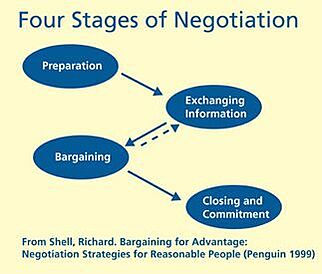Business negotiations are a crucial element of growth, whether you are involved in selling or buying of goods and services. The outcome of negotiations often determines your business future. For this reason, it is important that you develop strong negotiation skills for yourself and everyone on your team.
You can learn more bold business growth strategies in our related blog post.
Keys to Developing Strong Negotiation Skills
There are several factors that often result in failed business negotiations, including lack of confidence, overconfidence and lack of preparation. In this post, we’ll focus on the skills needed to improve your approach and your results in important negotiations.
Improve Your Communication Style
Your communication style is both verbal and non-verbal. Your style tells the other party a lot about you before you even make your first point. Three common styles that many business professionals exhibit include: passive, assertive and aggressive. Your personal style can greatly affect the outcome of any negotiation in which you are involved.
A passive communicator is does not seem to internalize what the other side needs. This style can convey a lack of commitment can tell the other person you are likely to give in to demands easily.
Aggressive communicators, on the other hand, often alienate other parties through adopting an overly firm hand on all matters.
Assertive communicators are engaged, firm and considerate. This communication style most often leads to the negotiator achieving a desired outcome because of the confidence and empathy he/she is able to show during negotiations.
Choose Negotiating Strategies
Negotiation is both an art and a science. It’s important to understand that no two negotiations are ever the same. Each session requires a different approach — sometimes your strategy even changes during the negotiation.
This often requires adopting strategies that internalize the other party’s interests, then forming your counter tactic. It is important to have more than one fallback position in case the primary approach fails. Note that the other party will also come prepared to get the best out of the deal. For clarity, especially for vital negotiations, ensure that you have your strategy in writing for planning purposes.
Another important part of negotiation skills is research about the other party. Ensure that you have an idea of what the other party wants, how badly they need it, and what they might be willing to offer. Also, ensure you understand their advantages over you.
Stages of Negotiation
In the book, Bargaining for Advantage: Negotiation Strategies for Reasonable People, the author presents four stages of good negotiations, as shown in the image below.

Source: Bargaining for Advantage, Shell
These general stages represent the process that takes place when there is any decision to be made between parties.
Key Negotiation Points
Within these stages, the process unfolds. The following key negotiation points describe interactions during three of the four stages, including Exchanging Information, Bargaining and Closing. These can be a guide to the interaction during your negotiation.
- Present initial statements: At the start of negotiations, you’ll both establish the initial viewpoints on the issue at hand. It is important that you clarify what is important to both parties and what you expect from the deal.
- Acknowledge points of agreement: At this point, focus on the major areas you both agree on. This can help to build rapport and cooperation. Do not talk about the arising problems just yet.
- Review alternatives on the table: Articulate what either party will gain from the available options. At this point, it is important to remain candid and considerate of either person’s opinion. If you feel that complete agreement is impossible, be willing to give some leeway, but only after exploring all win-win scenarios.
- Refine and/or change strategy: This is a deeper look into the areas both parties have agreed upon for more clarity. This is where it’s important that you’ve pre-identified in your own mind which points you are comfortable making a compromise on. A small concession on your part at this point can result in a more positive outcome in your favor.
- In case of impasse: This often happens in high-profile negotiations. Do not let disagreements discourage you. Keep the meetings going as long as necessary, but know when agreement is not forthcoming. The length of negotiations can sometimes lead the other party to compromise. In case this fails too, feel free to propose a postponement or consult an outside party for mediation.
- Closing the negotiation: If an acceptable agreement has been reached by this point, review the agreements, document the important points, and sign the agreement, if applicable. After the meeting, ensure that you follow up on agreed terms and also honor any and all commitments made. Showing integrity by holding up your end of the bargain will build your credibility and trust for future deals.
Training for business negotiations within your company training program should be considered an essential part of any employee development plan. Learn how to develop a solid sales training program here in our related post.
Strive for a Win-Win Outcome
One of the major areas of conflict is whether past interactions come into play with fresh negotiations. This includes both friendships and previous disagreements. Both situations can result in fear and ultimate failure in the negotiations. Other areas to avoid include secrecy, unfair ultimatums, sarcasm, over-reliance on shaky data and delaying tactics.
These behaviors are a recipe for poor negotiation skills and should be avoided from the onset. Remember, the most important goal of negotiation is to achieve an amicable win-win situation. That is only possible if both parties have the best intentions at heart. Using the negotiating tips above, you can practice fair and mutually-beneficial negotiations in business.
Developing strong negotiation skills on your team can go a long way to support your strategic business model. Download our helpful resource below, How Chickens Can Transform Your Business. It can help you choose and define the right business model for your organization.

